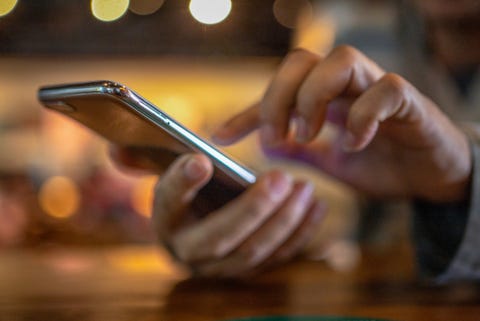It’s time to put an end to putting things off.
By , DEC 30, 2021, Click to read the Shondaland.com article here

That work project that you’ve had an entire month to complete is due tomorrow. You planned to spend the whole day focusing on it — but Facebook is just so much more appealing today. You promised yourself you’d work out this morning but, wait, aren’t there new episodes of your favorite show out? And yeah, yeah, you’ll take the trash out … eventually.
For many of us, procrastination is a way of life. And while all of us do it, some of us partake more than others. According to Joseph Ferrari, PhD, a procrastination researcher and professor of psychology in DePaul University’s College of Science and Health, 20 percent of men and women are chronic procrastinators. But why do we keep doing this?
The first step to overcoming your procrastination is to understand the reasons why you may be doing it. And no, it’s not a time management problem — at least according to Timothy A. Pychyl, PhD, an associate professor of psychology at Carleton University and the author of Solving the Procrastination Puzzle. “The reason why we procrastinate is we face a task that generates negative emotions in us, like resentment, frustration, or anxiety,” he says. “We’ve learned in life that we can get rid of those negative emotions, which we all want to do, by getting rid of the task.” In the short term, that works, Pychyl says. But long term, it fails because the task doesn’t typically go away. And then we’re working under time pressure.
So, procrastinating is what Pychyl refers to as “an emotion-focused coping response” and notes that we use avoidance to cope with negative emotions associated with the task.
Dr. Shirley Davis, the author of Living Beyond “What If?”: Release the Limits and Realize Your Dreams, shares these additional examples of why we procrastinate:
- The task seems bigger than we believe we can handle.
- The task is not something we like doing, or we may get distracted doing other things we prefer doing.
- We focus on the present or the immediate gratification, and don’t consider the long-term benefits if we take action now — e.g., we put off going back to school because it will take time, money, and a lot of effort over a few years, so we choose to stay on a job that pays right now.
- Needing to have everything perfect before we try something new.
- Fear sets in and paralyzes us from taking action (fear of failing, rejection, losing control, going broke, etc.)
Now that you know why you do it, how can you stop? Experts have a few suggestions.
Deal with your emotions
Since procrastination is rooted in emotion, the first step is to calm yourself down. Pychyl explains that when confronted with a task we are stalling on, the amygdala, the part of the brain associated with fight or flight, gets hijacked. An emotional response takes over, making us overwhelmed or frustrated or angry. “This really inhibits our whole ability to be planful and organized,” Pychyl explains. Thus, when you feel this way, he recommends stopping to take a few deep breaths. “Procrastination is an avoidance coping strategy, so if I can downregulate my emotional response, then I’m less likely to procrastinate,” he explains.
Put the focus on action
When you face a task and your whole body is screaming “run away,” Pychyl wants you to ask yourself: “What’s the next action I would take on this task if I was going to do it?” If you were putting off making a call, for instance, the first step would be to find your phone. “This is just a tiny, little action; it’s not thinking about the whole call,” says Pychyl. The idea is if you keep this action tiny, then you’ll ultimately realize, “‘Well, I can do that.’ … And that puts our focus on action and takes our focus off of our emotions,” Pychyl says. This primes the pump to get us started, and Pychyl says that, per his research, “Getting started is everything.”
So, if you walk into the kitchen and it’s a huge mess, don’t say, “I’m going to do the dishes.” That, says Pychyl, is too overwhelming. “Instead say, ‘I’m going to pick up that one plate and wash it.’” Once you get going, you’ll be more apt to continue.
Have a nonjudgmental awareness of your emotions
Let’s say that you’re procrastinating on a report. Stop and consider the emotions you’re feeling. If you identify that you are feeling really anxious about doing this report, ask yourself, why is that? “Well, because it’s so darn important,” says Pychyl. In this situation, he says it’s important to acknowledge: “I’m having anxiety because this is really important to me.” But once you recognize that the fact that this report is really important, use it as a motivator to get started instead of looking at it as something to avoid.
Instead of saying, “I’m going to exercise this morning,” Pychyl says to tie it into a specific task. So try: “When I finish my coffee, I’m going to go for a walk.” “The when/then statement is very powerful because we’re creatures of habit,” he explains. “And if we can put the cue for action in the environment, then we just don’t rely internally on our habits anymore.” Pychyl, for instance, learned to floss his teeth by using the following implementation intention: “I told myself, ‘When I pick up my toothbrush, then I will put the floss on the counter.’ So, that when/then statement puts the cue for the action into the environment,” he explains. “Whenever he puts his toothbrush down, he picks up the floss.”
Have friends hold you accountable
Davis says to enlist a few trusted friends and tell them your goal, task, or dream –– and when you plan to accomplish it. “Allow them to check in on your progress and celebrate your milestones along the way,” she says. When you feel the tendency to procrastinate, she suggests calling one of these accountability partners and talking about it. This has certainly worked for Zachary Hoffman, who runs Digital PR. “Each morning, my accountability partner and I check in and tell each other what we’ll be working on that day and what our goals are,” he explains. “We check in twice during the day and again at the end of the day.”
Tackle the big tasks first
This is a technique that shopping professional Daniel Adams implements. “Instead of easing into the day with smaller tasks, I find that if I complete a big task at the start, I feel motivated to do a great day’s work,” he says. He finds that if he starts with smaller tasks, on the other hand, he usually ends up putting off the big, important tasks until there’s not enough time in the day to even start them.
When all else fails, work with a professional
Meg Cooper, a wedding photographer in San Francisco, has been struggling with procrastination for years but recently saw a therapist who helped her create a system for getting things done. So far, it’s worked better than anything else she’s tried thus far: “I created a point system to map out what earns me points and also a number of free or low-cost rewards that I categorized into different tiers (each worth a different amount of points). Every day, I tick off the number of points I earn as I work, and at the end of the day, tally them up. Eventually, when I have enough to redeem something, I choose an activity and add that to my available rewards list — for redemption whenever I want,” she explains.
Focus on the big picture
Instead of a daily to-do list, which she never gets through, online marketing expert Maria Juvakka creates a monthly to-do list. “Most people make daily and weekly to-do lists, which keeps everything on a microscale,” she shares. “When you have the macro in front of you, such as writing two blog posts per month and uploading four YouTube videos, you’re less likely to procrastinate on the regular.” Having her long-term goals laid out, she’s found, helps her stay focused since she’s clearer on her “why.”
Be easy on yourself
Pychyl says research shows that people who self-forgive after procrastinating actually procrastinate less. “If you’re taking on these new strategies because you’d like to procrastinate less, it’s not always going to go really well,” he explains. “But if you don’t practice some self-compassion and some self-forgiveness, you’re just setting yourself up for future failure.” And know that it may take time to get these skills to work for you. Pychyl says if you ask him if he procrastinates, he’ll say no. “But it’s not because I magically developed any special virtues. It’s just that I use these skills compulsively,” he proclaims.
Nicole Pajer is a freelance writer whose work has been published in The New York Times, AARP, Woman’s Day, Parade, Men’s Journal, Wired, Emmy Magazine, and others. Keep up with her adventures on Twitter at @nicolepajer.


